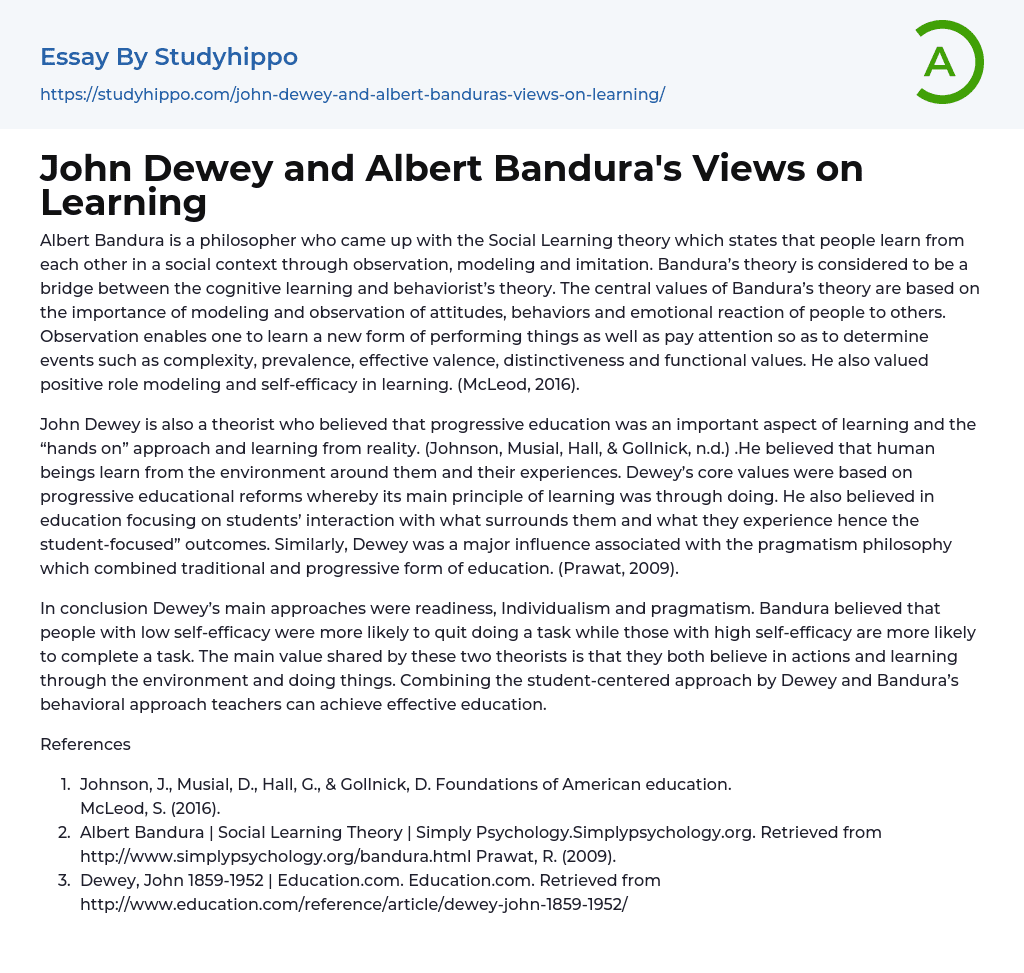

John Dewey and Albert Bandura’s Views on Learning Essay Example
Albert Bandura is a philosopher who came up with the Social Learning theory which states that people learn from each other in a social context through observation, modeling and imitation. Bandura’s theory is considered to be a bridge between the cognitive learning and behaviorist’s theory. The central values of Bandura’s theory are based on the importance of modeling and observation of attitudes, behaviors and emotional reaction of people to others. Observation enables one to learn a new form of performing things as well as pay attention so as to determine events such as complexity, prevalence, effective valence, distinctiveness and functional values. He also valued positive role modeling and self-efficacy in learning. (McLeod, 2016).
John Dewey is also a theorist who believed that progressive education was an important aspect of learning and the “hands on” approach and learning from reality. (Johnson, Musial
..., Hall, & Gollnick, n.d.) .He believed that human beings learn from the environment around them and their experiences. Dewey’s core values were based on progressive educational reforms whereby its main principle of learning was through doing. He also believed in education focusing on students’ interaction with what surrounds them and what they experience hence the student-focused” outcomes. Similarly, Dewey was a major influence associated with the pragmatism philosophy which combined traditional and progressive form of education. (Prawat, 2009).
In conclusion Dewey’s main approaches were readiness, Individualism and pragmatism. Bandura believed that people with low self-efficacy were more likely to quit doing a task while those with high self-efficacy are more likely to complete a task. The main value shared by these two theorists is that they both believe in actions and learning through the environment an
doing things. Combining the student-centered approach by Dewey and Bandura’s behavioral approach teachers can achieve effective education.
References
- Johnson, J., Musial, D., Hall, G., & Gollnick, D. Foundations of American education.
McLeod, S. (2016). - Albert Bandura | Social Learning Theory | Simply Psychology.Simplypsychology.org. Retrieved from http://www.simplypsychology.org/bandura.html Prawat, R. (2009).
- Dewey, John 1859-1952 | Education.com. Education.com. Retrieved from http://www.education.com/reference/article/dewey-john-1859-1952/
- Email essays
- Hypertext Transfer Protocol essays
- Marshall Mcluhan essays
- Virtual Learning Environment essays
- Web Search essays
- Etiquette essays
- Mainstream essays
- Vodafone essays
- Web Search Engine essays
- Android essays
- Application Software essays
- Benchmark essays
- Computer Network essays
- Computer Programming essays
- Computer Security essays
- Computer Software essays
- Cryptography essays
- Data collection essays
- Data Mining essays
- Graphic Design essays
- Information Systems essays
- Internet essays
- Network Security essays
- Website essays
- World Wide Web essays
- Albert Camus essays
- Aristotle essays
- Carl Jung essays
- Henry David Thoreau essays
- Immanuel Kant essays
- John Dewey essays
- Karl Marx essays
- Machiavelli essays
- Michel Foucault essays
- Plato essays
- Rene Descartes essays
- Rousseau essays
- Socrates essays
- Thomas Hobbes essays
- Acceptance essays
- Age Of Enlightenment essays
- Child Observation essays
- Confucianism essays
- Conscience essays
- Critical Reflection essays
- Destiny essays
- Determinism essays
- Empiricism essays
- Environmentalism essays
- Epistemology essays



